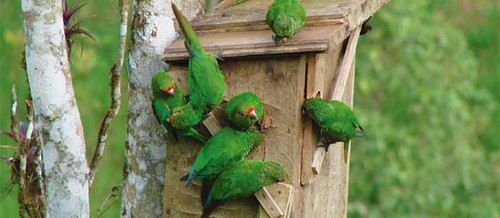 El Oro Parakeets, Fundacion JocotocoMALIBU, California, June 10, 2004 (ENS) - A husband and wife team of environmentalists has scored a victory in saving a critically endangered bird in Ecuador. The El Oro parakeet, a species discovered 24 years ago by ornithologist Dr. Robert Ridgely, had declined to an estimated 125 birds.
El Oro Parakeets, Fundacion JocotocoMALIBU, California, June 10, 2004 (ENS) - A husband and wife team of environmentalists has scored a victory in saving a critically endangered bird in Ecuador. The El Oro parakeet, a species discovered 24 years ago by ornithologist Dr. Robert Ridgely, had declined to an estimated 125 birds.
Following a conservation trip to Ecuador in April, Larry and Sara Wan, founders of the Western Alliance for Nature, launched a campaign to purchase and secure an 80 acre forest parcel where the El Oro parakeet nests. The property is adjacent to the 3,000 acre Buenaventura reserve established in 1999 by Dr. Ridgely, author of the "Birds of Ecuador."
"Sara and I explored the area with Dr. Ridgely," said Larry Wan, a wildlife photographer. "It's located in a tropical cloud forest in southwestern Ecuador that contains the nesting trees for the parakeet, as well as howler monkeys that are also highly endangered in Ecuador. The area harbors other spectacular birds such as the rare long-wattled umbrellabird and a host of colorful hummingbirds and tanagers."
But trees in the forest where the parakeets and other birds habitually feed and nest were being cut down to provide grazing for the owner's cattle, and being deliberately felled to destroy the birds' nests, the Wans observed.
"Previously, the property owner had refused to sell his property," said Larry Wan, "but being a local politician in need of cash to finance his campaign for election this year in Ecuador, he finally offered to sell the land to raise campaign money. The catch was that the land needed to be purchased immediately, before the election, because after that time, we didn't feel he could be counted on to sell at a reasonable price, if at all."
In an urgent campaign to raise the funds to save the parakeets' habitat, the Western Alliance for Nature challenged potential donors, offering to match any contribution toward the purchase of the El Oro habitat.
Supporters responded to the appeal and, with matching donations from the Wans, the acquisition funds were secured in less than 60 days.
Dr. Ridgely was delighted with the fundraising effort. "This is terrific," he said. "And indeed quite unprecedented in terms of the short time involved. I look forward to working with you in the future as we move to ensure the future of Ecuador's rarest birds," he told the Wans.
The nesting site will be annexed to the Buenaventura reserve. It will contain cloud forest habitat not protected elsewhere that will offer secure refuge for the El Oro parakeet.
Most locals in the area are supportive of the reserve, said Larry Wan, because they recognize that it secures a consistent and higher quality water supply downstream as well as bringing the ecotourism that provides an economic benefit for preserving natural resources.
"What is remarkable," he said, "is that this was accomplished by individual grassroots contributions, with no government funding. It is inspiring to see the power and passion of individuals who care for another species."
In Ecuador, Larry Wan captured on film an image of a male umbrella bird in its full unique plumage. Dr. Ridgely said it may be the only existing photo of the males of this species.
Although the Wans spotted the El Oro parakeet, no photograph was possible due to the heavy mist of the cloud forest even after two days of hauling heavy camera gear over steep, slippery terrain in the hot and humid forest. "I will return to try again to capture an image of this rare and lovely bird," Wan vowed.
Sara Wan is the past chair and a current member of the California Coastal Commission. Through passage of a Coastal Commission resolution, she played a role in defeating the proposed Mitsubishi salt factory near the San Ignacio Lagoon in Mexico where gray whales give birth and nurture their young before their return migration to the Bering Sea.
The resolution discouraged the Mexican government and Mitsubishi from proceeding with the project.
The Western Alliance for Nature has been involved in the successful nest site protection program at Ormond Beach in Ventura County, California, overseeing a one mile stretch of sand dunes where the endangered California least tern, and the threatened Western snowy plover both nest in the sand. That area includes 10 protected species.
Sara Wan is also involved in efforts to secure additional land at Bolsa Chica, another important Southern California wetland.
"The billions of taxpayer dollars spent on space exploration have only taught us that a living planet like ours is hard to find," Larry Wan said. "The life forms that share this planet may be our only companions in a vast and lonely universe."
"Every contributor can take pride in having participated in the preservation of a critical habitat of global ecological significance," Larry Wan said. "In fact, as soon as trails are perfected on the reserve, the Western Alliance for Nature intends to organize a tour for all contributors interested in visiting and seeing for themselves the species and habitat they helped to save."